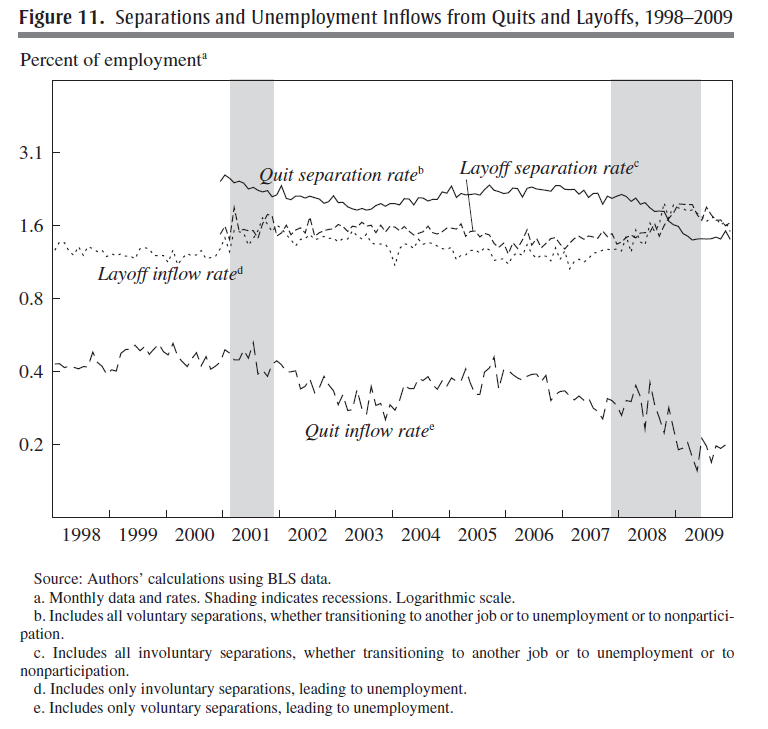Why don’t people quit their jobs more during a recession? asks tenured University of Chicago economist
It’s difficult to know where to begin with this post from Casey Mulligan (the comments are definitely worth reading). He starts off by implying that those who might want to characterize the recession as involving “a lack of hiring” are simply misled by the nature of aggregate data on hiring and separations. He goes on to say this is due to the fact that turnover rates (and therefore hiring and separations) for younger people are higher throughout the business cycle than for older workers. He links to this 2010 Brookings paper by Michael Elsby, Bart Hobijn and Aysegul Sahin. Unfortunately for Mulligan’s point, the authors have this to say:
Measures of unemployment flows for different labor force groups yield an important message on the sources of the disparate trends in unemployment across those groups: higher levels and greater cyclical sensitivity of joblessness among young, low-skilled, and minority workers, both in this and in previous downturns, are driven predominantly by differences in rates of entry into unemployment between these groups and others. In sharp contrast, a striking feature of unemployment exit rates is a remarkable uniformity in their cyclical behavior across labor force groups—the declines in outflow rates during this and prior recessions are truly an aggregate phenomenon.[p.3]
While Mulligan states, correctly, that “[e]stimated job separations among employees ages 25-54 were 33 percent greater in 2009 than they were in 2007,” he stumbles into trouble by asserting that “the low employment rates for young people since 2007 are almost entirely explained by low hiring rates.” While the latter statement is true, it is also true, and conspicuously absent from Mulligan’s piece, that hiring rates fell as much for older workers as for younger workers. Figure 8 of the Elsby, Hobijn and Sahin paper clearly shows this dynamic: hiring has dropped precipitously for all age groups since 2007, while separations increased by much more for older workers and remains higher than the 2007 level.
Given the plunge in hiring detailed in the paper Mulligan refers to, what is one to make of this argument:
Before the recession began, quits were by far the most common type of separation; now the number of quits about equals the number of layoffs.
Perhaps the decline in quits is a signal of what’s ailing the economy, although I view it largely as a consequence of the unemployment insurance system. A person who quits his or her job is not eligible for unemployment insurance. As a result, calling a job separation a “quit” rather than a “layoff” results in the loss of unemployment benefits.
For some strange reason, Mulligan chooses to focus on separations, rather than unemployment inflows, and then blames unemployment insurance for this trend (Casey-watchers will have seen this coming a mile away). Of course, separations includes people who leave one job to go to another job. Separation trends from quits and layoffs are reported in Figure 11 in the Elsby, Hobijn and Sahin paper (see below), which I guess is where Mulligan got that trend. Interestingly, that same figure also shows inflows into unemployment from layoffs and quits, which paint a somewhat different picture than the one Mulligan wants us to see:
The quit inflow rate, always much lower than the layoff inflow rate, falls during the recession, and if history is our guide will continue falling, while the inflow rate from layoffs increases. They aren’t the same. Now, quits are falling, as Mulligan says. But here’s another possible explanation for that phenomenon that seems to escape Mulligan: people are more reluctant to willingly leave their jobs during a recession because it is much harder to replace their lost income, i.e. find another job, in a climate in which layoffs are on the rise. In my view, that is much more plausible than the “attractiveness” of unemployment benefits. As far as the likelihood that companies would rather lay people off than fire them during a recession, Mulligan clearly betrays the fact that he has no experience in, or knowledge of, the private sector which he so dearly loves. I’ll let one of his commenters make the case more plainly:
Northsider, St. Paul, MN
Mulligan makes truly goofy arguments here. This guy is a professor??? How far has the University of Chicago fallen?
So—collecting unemployment benefits longer, so $10,000 is collected instead of $3,600, creates more of an incentive not to work? Please explain how the people influenced by this “incentive” knew they’d be collecting longer than the historical norm when they started out? Does this magical incentive somehow reach backwards in time?
Even goofier, the claim that “overall employers and employees now often have a lot to gain by calling their separation a layoff rather than a quit.” As somebody who works in HR for a company that had a lot of layoffs, I can inform Dr. Mulligan that no company has any incentive whatsoever to call a quit a layoff. Employers’ UI tax rates are directly tied to the unemployment claims that go against their accounts, so every employer is strongly motivated to call a quit a quit and avoid that liability. The COBRA subsidy that existed for awhile increased that employer motivation even more, because guess who’s on the hook for those medical bills?
It boggles my mind that people pay $30,000 per year to go to the University of Chicago so they can be “educated” by economists so out of touch with reality.
Couldn’t have said it better myself.




 ShareThis
ShareThis
As one who’s run many businesses, I had that same question about Mulligan’s assertion re: employers’ incentives. I was thinking maybe I wasn’t understanding him properly, but as Northsider suggests, it seems more likely that the misunderstanding is Mulligan’s.
My daughter goes to U of C — great place — but I’m happy to say she’s studying theater, and is largely insulated from the insane people across the way at Booth.